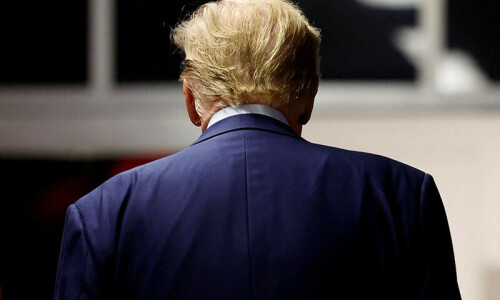SINGAPORE: In the depths of Argentina’s financial crisis in 2001, US economist David Hale suggested Buenos Aires would get Washington to bail it out if it could only persuade the American military to set up a base on its soil.
Hale was only half-joking. One of the distinguishing features of all modern financial crises, he wrote, is that the United States intervenes aggressively when it has military ties with the stricken country. Thus South Korea won US help during the 1997/98 Asian crisis, but Thailand and Indonesia did not.
Two years on, Washington’s conduct of economic policy in the aftermath of the Iraq war seems to be buttressing Hale’s theory, most strikingly in the way Treasury Secretary John Snow has endorsed massive dollar purchases by ally Japan to prevent a rise in the yen that would damage its vital export industries.
China, by contrast, which unlike Japan withheld its support for the war, is under pressure from Snow, lawmakers and Federal Reserve Chairman Alan Greenspan to revalue its currency to shrink its $103 billion trade surplus with the United States.
“The high politics of diplomacy is clearly more important than the low politics of economics,” said Richard Jerram, chief economist with ING Financial Markets in Tokyo.
“It seems fairly clear that anybody who’s helping America is an untouchable friend.”
IT HELPS TO BE FRIENDS: Mired in deflation and drowning in bad loans, Japan is in such difficulty that economists agree a sharp rise in the yen would snuff out recent signs of a modest pick-up in growth.
Still, Snow’s carte blanche to Tokyo to press on with record-breaking yen-selling intervention, which totalled $59 billion in the first half of the year, has raised eyebrows.
“My personal view is that they would not be as sympathetic to these problems if Japan were allied with Germany and France in opposing the war with Iraq,” said Marshall Gittler, a currency strategist with Deutsche Bank in Tokyo.
Snow said on Friday that, while currency intervention should be kept to a minimum, Japan was grappling with tough problems. “As they deal with these things we’re not going to be critical at all of them for their actions,” the Treasury chief said.
Washington has not been shy about linking geopolitics and economic policy. While pursuing a free-trade pact with Australia, which sent troops to Iraq, it has pointedly snubbed a similar request from New Zealand, which opposed the invasion.
Asked last month whether the United States used free trade talks to reward allies, Trade Representative Robert Zoellick told Reuters: “Clearly on the non-economic side it helps to have a positive and friendly relationship.”
Iraq is not the only hot political issue influencing US economic policy.
Kenneth Courtis, Goldman Sachs’s vice-chairman for Asia, said Washington’s need for Chinese help in defusing an international crisis over North Korea’s nuclear programme outweighed its desire to see a yuan revaluation.
“The US is going to be pushing China very hard on the security front with regard to North Korea. I hardly think they want to get diverted into a skirmish on what is after all a secondary issue for America,” Tokyo-based Courtis said.
LOBBYING POWER:
Moreover, despite complaints from some US manufacturers that China is pricing them out of business, Courtis said there was a formidable array of US firms that would be hurt by a dearer yuan, now pegged around 8.28 per dollar.
Wal-Mart Stores Inc buys more than $10 billion of goods a year from China that hold down prices for millions of consumer-voters, while over half of Chinese exports are churned out by factories owned by US and other multinational firms.
Thus, despite the flurry of comments from Washington, Courtis does not believe US policy on the yuan is set in stone yet. “I don’t think the US is hell-bent for leather for a big push on the Chinese currency at this point,” he said.
As for Japan, Courtis said Washington’s invitation to Tokyo to put a floor under the dollar/yen rate fitted snugly into the strategic framework of US-Japanese ties: in exchange for a US security guarantee, Japan agrees to keep most of its reserves in dollars, which in turn helps hold down US interest rates.
But while the current dollar/yen range is one both the United States and Japan can live with, Washington could not tolerate a yen weakening beyond, say, 130 to the dollar due to the damage it would do to US car makers and other industries in the run-up to elections just over 15 months away, Courtis said.
“At 135 or 140, I don’t think Snow would be saying the same thing,” he said.
Deutsche’s Gittler agreed that, even though recycled Asian trade surpluses keep US interest rates low, politicians ignored the impact of exchange rates on jobs at their peril.
“It’s hard to prove to people the link between capital inflows and their mortgage, but it is very easy to convince them of a link between imports and their jobs,” he said.—Reuters
















































Dear visitor, the comments section is undergoing an overhaul and will return soon.